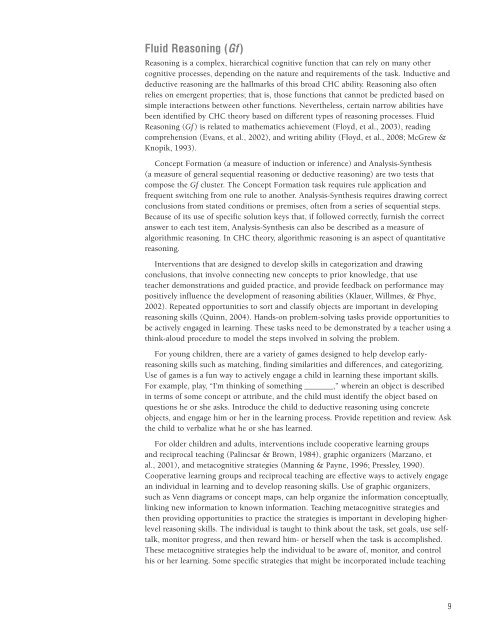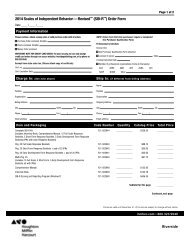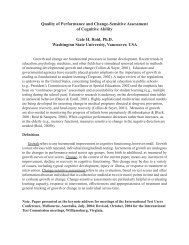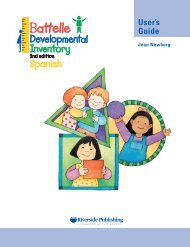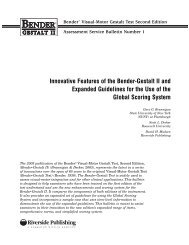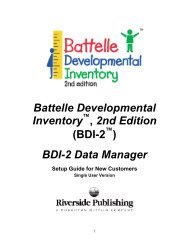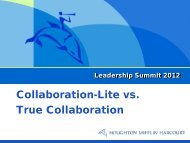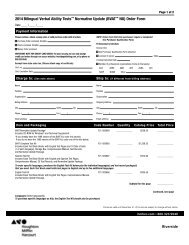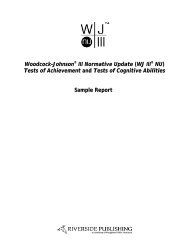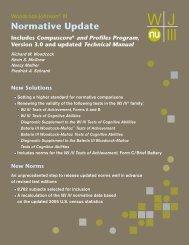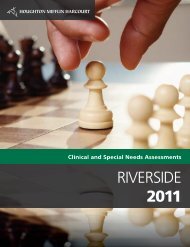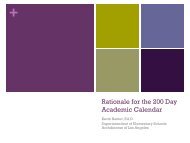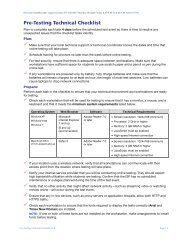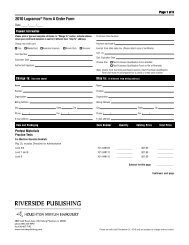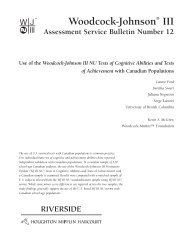Woodcock- Johnson III Tests of Cognitive Abilities - Riverside ...
Woodcock- Johnson III Tests of Cognitive Abilities - Riverside ...
Woodcock- Johnson III Tests of Cognitive Abilities - Riverside ...
You also want an ePaper? Increase the reach of your titles
YUMPU automatically turns print PDFs into web optimized ePapers that Google loves.
Fluid Reasoning (Gf )Reasoning is a complex, hierarchical cognitive function that can rely on many othercognitive processes, depending on the nature and requirements <strong>of</strong> the task. Inductive anddeductive reasoning are the hallmarks <strong>of</strong> this broad CHC ability. Reasoning also <strong>of</strong>tenrelies on emergent properties; that is, those functions that cannot be predicted based onsimple interactions between other functions. Nevertheless, certain narrow abilities havebeen identified by CHC theory based on different types <strong>of</strong> reasoning processes. FluidReasoning (Gf ) is related to mathematics achievement (Floyd, et al., 2003), readingcomprehension (Evans, et al., 2002), and writing ability (Floyd, et al., 2008; McGrew &Knopik, 1993).Concept Formation (a measure <strong>of</strong> induction or inference) and Analysis-Synthesis(a measure <strong>of</strong> general sequential reasoning or deductive reasoning) are two tests thatcompose the Gf cluster. The Concept Formation task requires rule application andfrequent switching from one rule to another. Analysis-Synthesis requires drawing correctconclusions from stated conditions or premises, <strong>of</strong>ten from a series <strong>of</strong> sequential steps.Because <strong>of</strong> its use <strong>of</strong> specific solution keys that, if followed correctly, furnish the correctanswer to each test item, Analysis-Synthesis can also be described as a measure <strong>of</strong>algorithmic reasoning. In CHC theory, algorithmic reasoning is an aspect <strong>of</strong> quantitativereasoning.Interventions that are designed to develop skills in categorization and drawingconclusions, that involve connecting new concepts to prior knowledge, that useteacher demonstrations and guided practice, and provide feedback on performance maypositively influence the development <strong>of</strong> reasoning abilities (Klauer, Willmes, & Phye,2002). Repeated opportunities to sort and classify objects are important in developingreasoning skills (Quinn, 2004). Hands-on problem-solving tasks provide opportunities tobe actively engaged in learning. These tasks need to be demonstrated by a teacher using athink-aloud procedure to model the steps involved in solving the problem.For young children, there are a variety <strong>of</strong> games designed to help develop earlyreasoningskills such as matching, finding similarities and differences, and categorizing.Use <strong>of</strong> games is a fun way to actively engage a child in learning these important skills.For example, play, “I’m thinking <strong>of</strong> something _______,” wherein an object is describedin terms <strong>of</strong> some concept or attribute, and the child must identify the object based onquestions he or she asks. Introduce the child to deductive reasoning using concreteobjects, and engage him or her in the learning process. Provide repetition and review. Askthe child to verbalize what he or she has learned.For older children and adults, interventions include cooperative learning groupsand reciprocal teaching (Palincsar & Brown, 1984), graphic organizers (Marzano, etal., 2001), and metacognitive strategies (Manning & Payne, 1996; Pressley, 1990).Cooperative learning groups and reciprocal teaching are effective ways to actively engagean individual in learning and to develop reasoning skills. Use <strong>of</strong> graphic organizers,such as Venn diagrams or concept maps, can help organize the information conceptually,linking new information to known information. Teaching metacognitive strategies andthen providing opportunities to practice the strategies is important in developing higherlevelreasoning skills. The individual is taught to think about the task, set goals, use selftalk,monitor progress, and then reward him- or herself when the task is accomplished.These metacognitive strategies help the individual to be aware <strong>of</strong>, monitor, and controlhis or her learning. Some specific strategies that might be incorporated include teaching9


